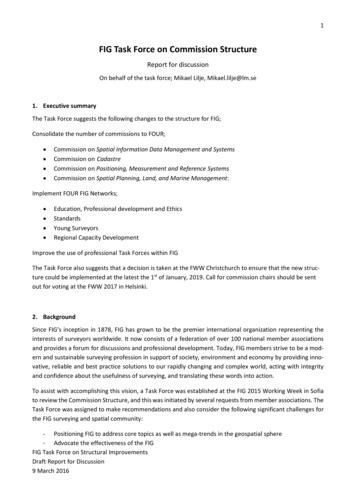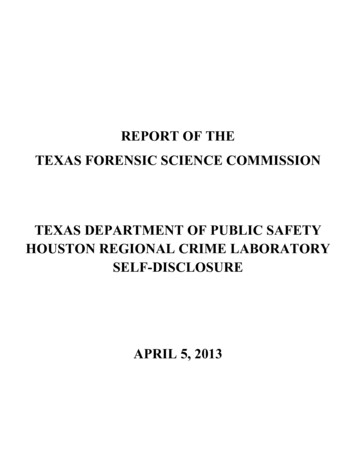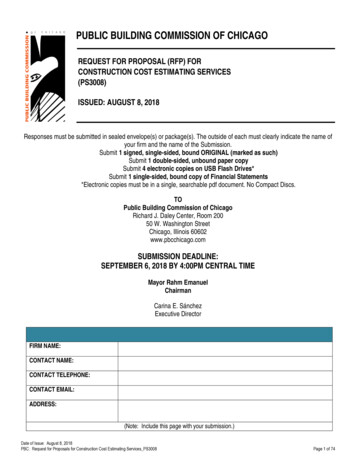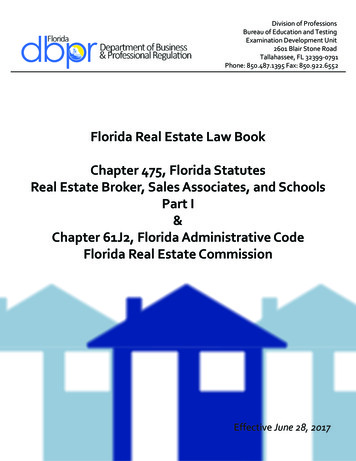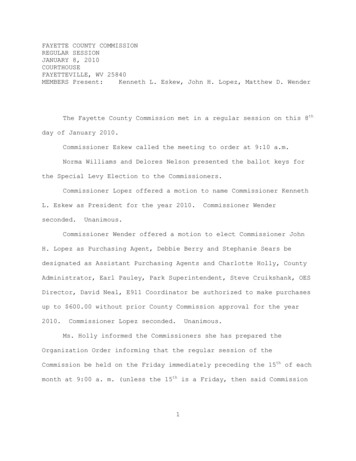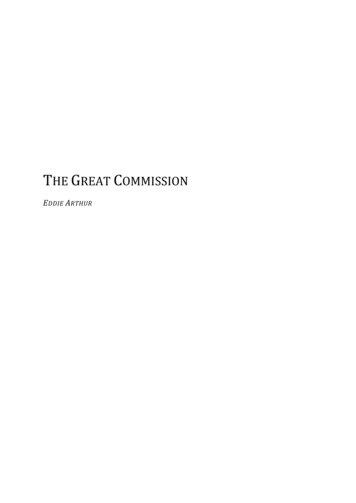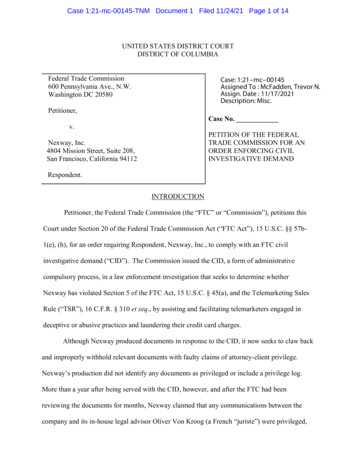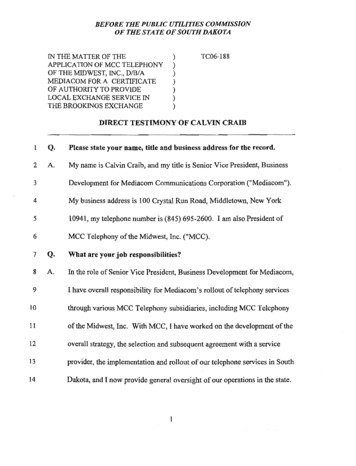
Transcription
BEFORE THE PUBLIC UTILITIES COMMISSIONOF THE STATE OF SOUTH DAKOTAIN THE MATTER OF THEAPPLICA TTON OF MCC TELEPHONYOF THE MIDWEST, INC., D/B/AMEDIACOM FOR A CERTIFICATEOF AUTHORITY TO PROVIDELOCAL EXCHANGE SERVICE IN))))))THEBROOKlNGSEXCHANGE)TC06-188DIRECT TESTIMONY OF CALVIN CRAIBIQ.Please state your name, title and business address for the record.2A.My name is Calvin Craib, and my title is Senior Vice President, Business3Development for Mediacom Communications Corporation ("Mediacom").4My business address is 100 Crystal Run Road, Middletown, New York510941, my telephone number is (845) 695-2600. I am also President of6MCC Telephony of the Midwest, Inc. ("MCC).7Q.What are your job responsibilities?8A.In the role of Senior Vice President, Business Development for Mediacom,9I have overall responsibility for Mediacom's rollout of telephony services10through various MCC Telephony subsidiaries, including MCC Telephony11of the Midwest, Inc. With MCC, I have worked on the development of the12overall strategy, the selection and subsequent agreement with a service13provider, the implementation and rollout of our telephone services in South14Dakota, and I now provide general oversight of our operations in the state.
1Q.What is your background in the telecommunications business?2I have 24 years of experience in the cable television and related industries.3I joined Mediacom in April 1999 as Vice President, Business development4and was promoted to Senior Vice President in August 2001. Prior to5joining Mediacom, I served as Vice President, Finance and Administration6for Interactive Marketing Group from June 1997 to December 1998 and as7Senior Vice President, Operations and Chief Financial OffIcer for Douglas8Communications from January 1990 to May 1997. I have also served in9various financial management capacities at Warner Amex Cable10Communications and Tribune Cable.11Q.Please briefly describe your company's corporate structure.12A.Mediacom Communications Corporation is a publicly traded company and13the parent of several wholly owned subsidiary companies including MCC14Telephony, Inc. MCC Telephony, Inc. is a parent of several wholly owned15subsidiary companies including MCC Telephony of the Midwest, Inc.2
1Q.Are you familiar with the Application your company submitted to thisCommission?23A.Yes, I am familiar with the Application.4Q.What is the purpose oryouT testimony?5A.The purpose ofthe testimony is to describe the operations ofMCC and to6discuss the proposed expansion of our certificated authority to include those7areas served by Swiftel. By so doing, I will demonstrate that MCC has the8requisite fInancial, technical and managerial capability to provide facilities-9based local and long distance Internet protocol voice services in the Swiftelservice territory in the State of South Dakota.1011Q.certification?1213What is yonr understanding regarding MCC's application for CLECA.It is my understanding that, given the current unsettled nature of the issues14pertaining to the appropriate regulatory treatment of IP-based voice services15such as those proposed by MCC, MCC does not concede that the IP-based16voice services described in its Application are subject to state regulation. 117understand that in its application MCC had expressly reserves all rights with18respect to the regulatory classification or treatment of its IP-enabled voice19services.20The Federal Communications Commission addressed the question of21whether VoIP services, such as digital phone, are subject to state and/or3
1federal regulation In the Matter of Vonage Holdings Corporation Petition2for Declaratory Ruling Concerning a Order ofthe Minnesota Public3Utilities Commission, w.e. Docket No. 03-211, Memorandum Opinion and4Order, FCC 04-267, released November 12,2004 ("Vonage Order").5Paragraph 32 ofthe Vonage Order indicates that to the extent cable6companies provide similar VolP services, state regulation is preempted.7The FCC preempted the states from imposing "certification, tariffmg or8other related requirements as conditions to offering digital voice.9Vonage Order -,r 46.I'10Q.How will this affect regulatory compliance issues?11A.While reserving all its rights, as described above, MCC has and will12continue to make all reasonable efforts to abide by the Commissions rules13respecting the provision of voice services, in particular those pertaining to14collection and remittance of 911 and other similar fees. MCC does not15want anything in its application or filings with the Commission to be16construed as a concession or admission by MCC that the IP-enabled voice17service it describes constitutes a telecommunications service, and18infonnation service, local exchange service, cornmon carrier offering, or a19service that is otherwise subject to federal or state regulation.4
Q.certification.23Please describe the services offerings for which MCC seeks expandedA.MCC seeks authority to expand its certificated authority to include the4Swiftel service area. MCC seeks this authority so that it can offer any of5the services that a certificated CLEC is able to offer. MCC proposes to6offer its IP-enabled voice services in the Swiftel service area in the same7manner as it currently offers those services in other parts of South Dakota.89Q.identified in its Application?1011What service does MCC intend to offer in the Swiftel territoryA.MCC anticipates that it will provide the same facilities-based Internet12Protocol ("IP") voice service currently being provided to MCC customers13elsewhere in South Dakota and across the country. MCC is currently14providing features similar to those offered by traditional analog telephone15service but utilizes IP technology to transport telephone calls. Customers16are able to call and be called by other IP voice service subscribers as well as17other parties connected to thc public switched telephone network C'PSTN").18The service is offered on a bundled flat-rate basis and allows standard local19calling in addition to operator services, directory assistance, enhaIJ.ced "911 "20services, outbound 800 toll free calling, custom calling features such as call21waiting, caller identification, and directory listing. From a consumer5
1perspective, MCC currently provides unlimited local and long distance2calling for a single price that includes popular calling features. MCC3utilizes local number portability permitting consumers to maintain their4existing telephone numbers in addition to whole-home wiring and the5opportunity to utilize each telephone jack in the home.6Q.What facilities will MCC use to pro-vide this service?7A.MCC predominately uses the 1acilities of Mediacom to provide the IP voice8services. Mcdiacom owns and manages cable systems serving9approximately 1.4 million subscribers in 23 states. Mediacom's telephony10subsidiaries provide voice services to over 200,000 subscribers throughout11Mediacom's cable service territories. In South Dakota, Mediacom facilities12pass approximately 16, 557 homes in nineteen different communities.13These facilities are capable ofproviding all of these homes with high speed14internet services. MCC draws upon the engineering and technical support15of its specialized staffs to manage its network and provision services. The16services are delivered over a managed network with quality of service17standards, ensuring that customers arc provided with the level of quality18offered by traditional telephone seIVice and to which they are accustomed.19In order to reach premises not served by Mediacom, calls must at times20traverse the PSlN. MCC completes these calls through relationships with21competitive local exchange carriers that provide a variety of services,6
1including the termination of local and toll calls, the provision of directory2assistance and operator services, and the delivery of 911 calls to the3appropriate public safety answering points. Calls destined for PSTN are4terminated in accordance with intercarrier compensation regimes. MCC5currently has an agreement with Sprint Communications Company, L.P.6C'Sprint") to carry MCC's traffic. Sprint then interconnects with the local7exchange carricf.8Q.Which carrier or carriers serve as your underlying carrier forinterexchange services?910A.At present, MCC uses Sprint as its underlying carrier.11Q.Please discuss the managerial and technical ability of MCC to provide12services in South Dakota.13A.Previously, the Commission concluded that MCC possessed the managerial14and technical resources to provide telecommunications services. MCC15continues to rely on the same individuals identified in its initial16certification. Moreover, the officers ofMCC have extensive managerial17and technical experience in the telecommunications industry. Locally and18nationally, MCC is managed and operated by a team of well qualified19telecommunications professionals who are capable of operating a company20which will provide sophisticated, state of the art Internet Protocol voice21services similar to those offered by traditional analog telephone service7
providers.12Q.How are customer inquiries/disputes handled?3A.MCC has a toll free customer service number which is staffed 24-hours a4day, 7-days a week. Customer service representatives are well trained and5make every effort to address customer inquiries and resolve any issues or6disputes which may occur as expeditiously as possible. If the resolution7proposed by the representative is not satisfactory to the customer, the8customer may request to speak with a supervisor or send e-mail comments9via the Mediacom website, MCC will also investigate and respond to issues1011or concerns it may receive from utility commissions.Q.provide interexchange and/or local voice services?1213In what other states has MCC or affiliated entities received authority toA.Entities affiliated with MCC have received authority to provide interexchange14and/or local voice services in Alabama, Mississippi, Minnesota, Illinois, Iowa,15Missouri, Georgia, Florida, Indiana, Kentucky, California, Delaware,16Maryland, Wisconsin and South Dakota.17Q.Has MCC or any affiliated entity ever been denied certification inanother state?1819A.No. All ofMCC's certification appHcations have been successful.20Q.Has MCC or any affiliated entity ever applied to havc an existing21certification expanded into a rural territory?8
A.Yes, MCC sought expanded certification in Wisconsin.2Q.What has been the result of that petition?3A.MCC Telephony of the Midwest has received expanded certification in4Wisconsin allowing it to have CLEC status in the territory of a Rural Local5Exchange Carrier.6Q-Has MCC or any affiliated entity ever been subject to any federal orstate investigation regarding its services?78A.No.9Q.Describe the financial ability of MCC to operate as atelecommunications carrier.1011A.MCC Telephony ofthe Midwest, Inc. is a wholly owned subsidiary of MCC12Telephony, Inc. which is a wholly owned subsidiary of Mediaeom13Communications Corporation ("'Mediacom"). As14the Midwest relies on the fInancial capabilities of its ultimate parent,15Mediacom, to fund its operations within the state of South Dakota.16Q.MCC Telephony ofWill the issuance of an expanded certification to MCC be in the publicinterest?1718such A.Yes. The benefits available to customers and potential customers, and the19compliance with state and federal telecommunications policies encouraging20the development of competition in telecommunications markets,21demonstrates without question that MCCts provision of services is in the9
public interest.12Q.Will granting MCC's application promote and preserve competition?3A.Yes. Competition serves the public interest by bringing about lower rates,4improved quality of service, and enhanced services. Expanding MCC's5certification will increase competition in the Swiftel telecommunications6market. Furthermore, MCC's voice services make use of advanced and7developing technologies and give consumers the opportunity to take8advantage of the competitive options based on such emerging technology.9Q.Will granting MCC's application promote consumer choice?10A.Yes. Granting MCC's application will serve the public interest by allowing11Brookings consumers to have access, in many cases for the first time, to a12facilities-based competitive local telephone service. It is the ability of a13customer to choose between providers that requires MCC and the other14certified providers to compete for the business of the customer. To15effectively compete, MCC and the other providers must offer services that16are desired by customers at competitive prices and at a competitive level of17quality. MCC and the other providers must also maintain a competitive18level ofcustomer support to retain their customers. Simply put, customer19choice provides MCC the incentive to ofter the highest quality services and20the highest level of customer support for the lowest cost. IfMCC is21prohibited from offering or providing services in the territory, its customers10
would no longer have the choice to receive their services from MCC. The2inability ofMCC to provide services will result in less competitive pressure3on the Swiftel to keep their prices low and their service quality and support4high. Furthermore, IP-enabled voice technology can link phone calls with5other data which makes several new services possible. The technology6offers new flexibility to consumers who may be able to program their7phones to redirect calls to other numbers, take messages, and send email8responses to a voice call. Thus, granting MCC's application will greatly9enhance the availability of affordable local exchange service in Brookings10through the introduction of increased competition and alternative offerings11using a new technology.12Q.1314Will granting Mee's application have a positive impact on the qualityof life for the public while respecting privacy considerations?A.Yes.Mee's ability to provide local exchange service gives the public the15power to determine for themselves which provider offers services that best16fit their needs and budget. Having the ability to choose MCC or the RLECs17gives the customer the opportunity to select the provider that best responds18to its needs. The inability of a customer to select MCC deprives the19customer of a service alternative that may meet that customer's needs better20than Swiftel. These facts,· together with MCC's ability to provide Brookings21residents with the latest technology and communications features, means11
that MCC offers an efficient and secure alternative to current providers oftelecommunications services that enhances the quality of life for the public.23Q.Will granting MCC's application promote universal service?4A.Yes. MCC participates fully in state and federal universal service5mechanisms by assessing and remitting charges on subscriber bills that6support universal service. Moreover, because the introduction of7competition that would result from granting MCC's application also should8have the effect of lowering customer prices, it is logical that the9introduction ofMeC's service into Brookings will increase overallsubscribersmp.1011Q.including telecommunications infrastructure deployment?1213Will granting MCC's application promote economic development,A.Yes. MCC has and will continue to make plant and other capital14investments in South Dakota to support continued expansion of its15telephone service. MCC intends to protect this investment by continuing to16expand and upgrade its facilities to remain competitive and cwrent with the17latest technological advances in the field.18Q.delivery of telecommunications services to customers in South Dakota?192021Will granting MCC's application promote the efficient and productiveA.Yes Because MCCmust compete for customers, and because price is oftena substantial factor in a customer's choice of provider, MCC must make12
1every attempt to keep its prices dovVTI. To accomplish this goal, MCC2continually strives to operate as efficiently as possible. By operating in a3manner to maximize its productivity and efficiency, MCC also forces other4competitive providers to do likewise in order to remain viable competitors5in the marketplace.6Q.Does this conclude your testimony?7A.Yes it does.891011Dated thisLday of July, 2008.cQ!:it1213
MCC predominately uses the 1acilities ofMediacomto provide the IP voice services. Mcdiacom owns and manages cable systems serving approximately 1.4 millionsubscribers in 23 states. Mediacom'stelephony subsidiaries provide voice services to over 200,000 subscribers throughout Mediacom'scable service territories. InSouthDakota, Mediacom facilities
